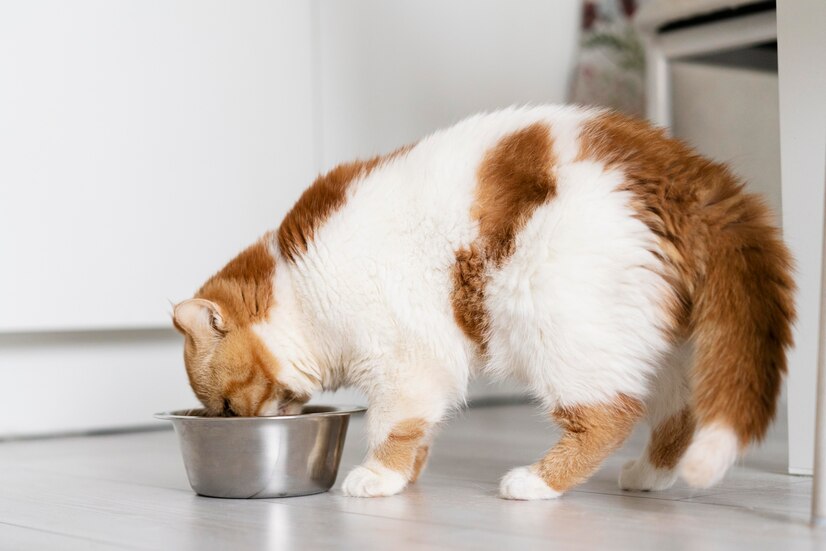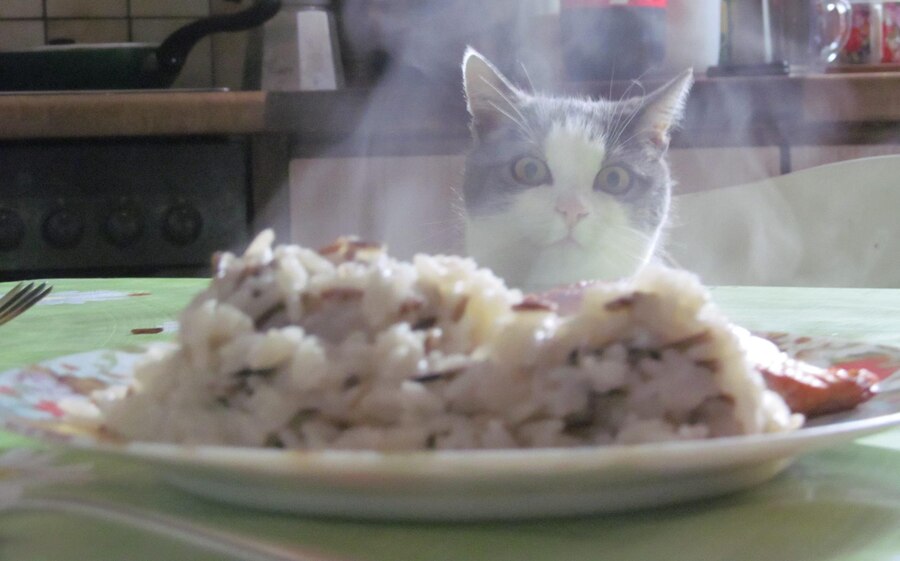Rice is a common staple in many human diets, and for good reason! It’s versatile, filling, and pairs well with various dishes, from hearty curries to burritos. But when it comes to our feline friends, is rice a safe or beneficial addition to their diet? While many commercial cat foods include small amounts of rice, the nutritional needs of cats differ from ours in significant ways. Here’s everything you need to know before letting your cat have a taste of this pantry staple.
Can Cats Eat Rice?
Yes, cats can eat rice in small amounts. Rice itself is non-toxic to cats, which means a little nibble here and there won’t harm them. However, rice doesn’t provide any nutritional benefits for cats, who are obligate carnivores and rely on animal proteins to thrive. Unlike dogs, which are omnivores and can digest various foods, cats require a diet primarily based on meat to meet their nutritional needs.
Is Rice Good for Cats?
While rice is safe for cats in small quantities, it doesn’t mean it’s necessarily good for them. Cats aren’t equipped to process carbohydrates like humans are. In fact, cats have almost no dietary requirement for carbs, as their natural diet is low in them. While some cat foods do contain rice or other grains, this is typically done to bulk out the food and lower costs, not because cats benefit from it nutritionally. Read Why Does My Cat Follow Me To The Bathroom
Feeding rice to cats in significant amounts can lead to them filling up on “empty calories,” potentially reducing their intake of essential protein-rich foods they actually need. Too many carbs can also contribute to obesity, a serious risk factor for health issues such as diabetes, arthritis, and heart disease in cats. Read Can cats see colors?
Rice for Cats with Diarrhea: Can It Help?
For cats experiencing mild diarrhea, a small amount of plain, cooked white rice mixed with their usual cat food may help firm up their stool. Rice can add a bit of bulk, potentially easing digestive upset. However, this should only be a temporary remedy, as rice isn’t a natural or nutritionally necessary part of a cat’s diet. Here’s how to approach rice for your cat with diarrhea:
- Cook It Thoroughly: Offer plain, fully cooked white rice without any added seasonings or spices.
- Serve Sparingly: Mix a teaspoon or so into their regular food – only for a short period until the diarrhea subsides.
How much rice can I give my cat a day?
Around 1-2 tablespoons of cooked white rice per day, maximum – and only occasionally. Not as a regular part of their diet.
White Rice vs. Brown Rice: Which is Better?
White Rice
White rice is easy to digest, and if your cat consumes it in small amounts, it shouldn’t cause any digestive issues. However, it’s largely devoid of nutrients and doesn’t add much to a cat’s diet. If your cat has stomach sensitivity or an upset stomach, some pet owners and vets recommend adding a bit of white rice to their diet temporarily as a bland option. Read Why Is My Cat Not Drinking Water? Causes, and Solutions
Brown Rice
Brown rice is less processed than white rice and retains more fiber, which might offer a small benefit for cats with minor digestive issues. However, it’s important to keep in mind that cats don’t typically need added fiber like humans do. Because of this, adding brown rice for “health” reasons isn’t generally recommended. Always consult your vet before feeding brown rice or any high-fiber food to ensure it’s safe and suitable.

When Rice Can Be Beneficial (With Caution)
In some cases, veterinarians might suggest rice as a temporary addition to a cat’s diet if they’re dealing with mild digestive issues. However, any dietary changes should be temporary and under veterinary guidance. Cats are far more sensitive to changes in diet than dogs or humans, so even “safe” foods can lead to gastrointestinal upset.
For cats experiencing diarrhea or vomiting, a small amount of plain, cooked white rice mixed with their regular cat food may help, but only under a vet’s recommendation.
Potential Health Risks of Feeding Rice to Cats
Although rice isn’t toxic, it’s not an ideal food for cats. Feeding your cat too much rice or including it too regularly could lead to potential health issues:
- Weight Gain and Obesity: Carbohydrates in rice add unnecessary calories to a cat’s diet, which can lead to weight gain if fed frequently. Obesity is a serious risk factor for various health problems in cats, including diabetes, which may require regular insulin injections to manage.
- Digestive Upset: While small amounts of rice are generally harmless, too much rice can cause bloating, gas, and stomach discomfort in cats. Cats are not built to process grains, so larger quantities may overwhelm their digestive system.
- Allergic Reactions: Although rare, some cats may have sensitivities or allergies to grains, including rice. Symptoms may include itching, skin irritation, or gastrointestinal upset.
How to Safely Feed Rice to Your Cat (If You Must)
If you choose to let your cat have a small amount of rice, follow these guidelines to keep it safe:
- Serve Cooked and Plain: Ensure the rice is well-cooked and free from any added seasonings, sauces, or spices. Ingredients like salt, butter, garlic, or onion can be harmful to cats.
- Keep Portions Tiny: Limit portions to a very small amount, such as a teaspoon, and avoid feeding rice regularly. An occasional taste is fine but stick to their usual balanced cat food as their primary diet.
- Observe for Reactions: If it’s your cat’s first time eating rice, watch them closely for any signs of digestive discomfort, vomiting, or bloating. If they show any adverse reactions, it’s best to avoid rice in the future.
- Avoid Uncooked Rice: Uncooked rice is tough on cats’ stomachs and may contain lectin, a natural pesticide that can lead to digestive upset if consumed in large quantities.
Is Rice Ever a Good Remedy for Upset Stomachs in Cats?
Pet owners may be familiar with using rice as part of a bland diet for dogs with stomach issues, but for cats, it’s a different story. While dogs can benefit from a bland diet of rice and boiled meat to soothe an upset stomach, this approach doesn’t work as well for cats. Cats’ digestive systems are specifically adapted for meat and may not respond as well to a grain-heavy meal. Read Can Cats Eat Cherries?
Instead, if your cat is frequently experiencing vomiting or diarrhea, it’s wise to consult your vet to find a more effective and cat-appropriate solution. Read Can Cats Eat Oranges?
Healthier Alternatives to Rice for Cats
If you’d like to share food with your feline friend, there are far better options than rice. Cats thrive on protein-based foods that resemble their natural diet. Here are some safe and healthier options:
- Cooked Chicken: Plain, boneless, and skinless chicken is a good source of protein and is usually well-tolerated by cats.
- Cooked Turkey: Turkey is another lean protein source that many cats enjoy.
- Fish (in Moderation): Small amounts of cooked tuna or salmon can be offered as a treat, though it shouldn’t replace a balanced cat diet.
Always ensure that any food you offer your cat is plain, without added salt or seasonings, and cooked to avoid any potential foodborne illnesses.
What to Do if Your Cat Eats Too Much Rice
If your kitty accidentally eats a larger quantity of rice or gets into uncooked rice, keep an eye on them for signs of discomfort. Symptoms of too much rice can include:
- Vomiting
- Diarrhea
- Gas and bloating
- Lethargy
- Straining in the litter box
Should any of these symptoms persist, especially if they last more than a day, contact your veterinarian for guidance.
Conclusion
Rice may be a popular staple in human diets, but it’s not necessary for cats. While a small amount won’t harm them, rice doesn’t provide the nutrition cats need and may even pose risks when eaten in larger quantities.
FAQ Section
Is cooked rice good for cats?
No, cooked rice is not nutritionally beneficial for cats. It provides minimal value and does not meet their dietary needs as obligate carnivores.
Is white rice toxic for cats?
White rice is not toxic but isn’t recommended as a significant part of a cat’s diet. It can be given occasionally in small amounts.
Can cats eat rice and milk?
No. Most adult cats are lactose intolerant, and combining rice and milk can lead to digestive issues like diarrhea and stomach upset.
Can cats eat rice and beans?
No. Beans are not digestible for cats and may cause gastrointestinal problems. Cats require animal-based proteins, not plant-based proteins.
Can cats eat rice every day?
No, rice should not be a daily food for cats. It lacks essential nutrients that cats need and could lead to nutritional deficiencies if fed regularly.



